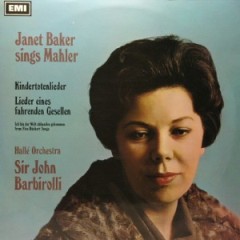Gustav Mahler – Janet Baker Sings Mahler (1999)
Gustav Mahler – Janet Baker Sings Mahler (1999)

Kindertotenlieder 1 - No. 1, "Nun will die Sonn' so hell aufgehn" 2 - No. 2, "Nun seh' ich wohl, warum so dunkle Flammen" 3 - No. 3, "Wenn dein Mutterlein tritt zur Tur herein" 4 - No. 4, "Oft denk' ich, sie sind nur ausgegangen!" 5 - No. 5, "In diesem Wetter, in diesem Braus" Ruckertlieder 6 - No. 1, "Ich atmet' einen linden Duft" 7 - No. 2, "Liebst du um Schonheit": "Liebst du um Schonheit, o nicht mich liebe!" 8 - No. 3, "Blicke mir nicht in die Lieder!" 9 - No. 4, "Ich bin der Welt abhanden gekommen" 10 - No. 5, "Um Mitternacht': "Um Mitternacht hab' ich gewacht" Lieder Eines Fahrenden Gesellen 11 - No. 1, "Wenn mein Schatz Hochzeit macht" 12 - No. 2, "Ging heut' Morgen ubers Feld" 13 - No. 3, "Ich hab' ein gluhend' Messer, ein Messer in meiner Brust" 14 - No. 4, "Die zwei blauen Augen von meinem Schatz" Dame Janet Baker (Mezzo Soprano) Hallé Orchestra New Philharmonia Orchestra Sir John Barbirolli - conductor
Only if you prefer, as Mahler did, a male soloist can you possibly want more; but if he had ever heard Janet Baker, he too would surely have changed his mind.
This disc is such a familiar face in the classical record catalogue that it has become the point of reference for Mahler song cycles. It would appear to be virtually beyond criticism, yet it is worth remembering that on its first release (minus the Rückertlieder) it did not meet with universal praise. Indeed, our pre-eminent Mahlerian, Deryck Cooke, found quite a few things that were not to his taste, particularly the over-affectionate phrasing from the conductor. Listening again to the now 35-year-old recordings makes one realise where some of that criticism was coming from, as well as making one sit up in admiration for the quality of musicianship on display, especially from Baker.
As might be expected with these artists, the songs that come off best are the deeper, more introspective ones. There is no better example than ‘Ich bin der Welt abhanden gekommen’, and many collectors will already know the classic New Philharmonia version from the complete recording of 1969. EMI do us a real service by including here an earlier recording from 1967 which was made using spare studio time from the main sessions. If anything, it is even finer than the later one, showing a truly breathtaking control of words and shaping. The half tones employed by Baker give the song an ethereal feel, an almost other-worldly atmosphere that is difficult to dislodge from one’s mind. The spare instrumental lines are beautifully played by the Hallé. Generally this must count as one of the greatest versions of this song now before the public, the only real comparison coming from these same artists two years later. The intensity is still there, but the sense of wonderment and discovery in the earlier version is something rather special.
These general observations could be applied to other songs on the disc. I was particularly taken with ‘Nun will die Sonn’ so hell aufgeh’n’, the first of the Kindertotenlieder. How wonderful Baker’s handling of the text is here, with the tone filling out majestically on the words ‘in ewig Licht’ at around 3’56. Listen also to Barbirolli’s illumination of the cello line at 5’20, where the moulding of the phrase is so pliable. The heartrending shift to D major in the second song ‘Nun she ich wohl’, (around 2’51) with Baker floating over the orchestra on the word ‘Leuchten’, is thoroughly typical of these two artists’ loving attention to detail.
Where they are less successful (and this is probably where Cooke’s misgivings were directed) is in the more youthful ‘Wayfarer’ cycle. Here there is no doubt that a slightly more fleet-of-foot accompaniment would have helped. They just about get away with it in ‘Wenn mein Schatz Hochzeit macht’, though even here one feels Baker wants to move things on against her conductor’s wishes. But the second song, the famous ‘Ging heut morgen übers Feld’ is simply too plodding to be properly effective. If one compares Brigitte Fassbaender and Riccardo Chailly (Decca) here, there is no doubt the faster tempo and ‘sprung’ accompaniment is far more convincing. The wild storm of ‘Ich hab ein glühend Messer’ is also a touch tame for my liking in Barbirolli’s hands, where Chailly really whips up excitement. One also feels that Chailly observes correctly Mahler’s marking of without sentimentality in ‘Die zwei blauen Augen’, whereas Barbirolli teeters perilously close to it. Having said that, the constant illumination of words and phrases from Baker and Barbirolli usually more than compensate. It is just worth remembering that there is more than one approach to these masterpieces, and most serious collectors would almost certainly not be content with only one version of the complete cycles. As mentioned above, ‘Ich bin der Welt’ seems to be in a different class from almost anything else on the disc, and is worth the modest outlay for that alone.
Recording quality is excellent, full, warm and spacious, with plenty of detail. Affectionate notes (to match the music making) are by the friend of both artists, Michael Kennedy. Keen Mahlerites will probably have these performances anyway, but younger collectors investing in this new incarnation will have little cause for complaint.--- Tony Haywood, MusicWeb International
download: uploaded yandex anonfiles 4shared mediafire solidfiles mega filecloudio nornar
Last Updated (Tuesday, 16 December 2014 14:52)








